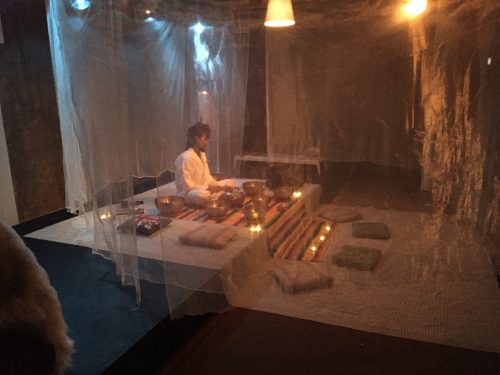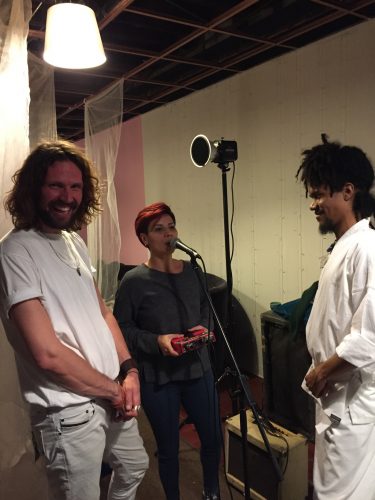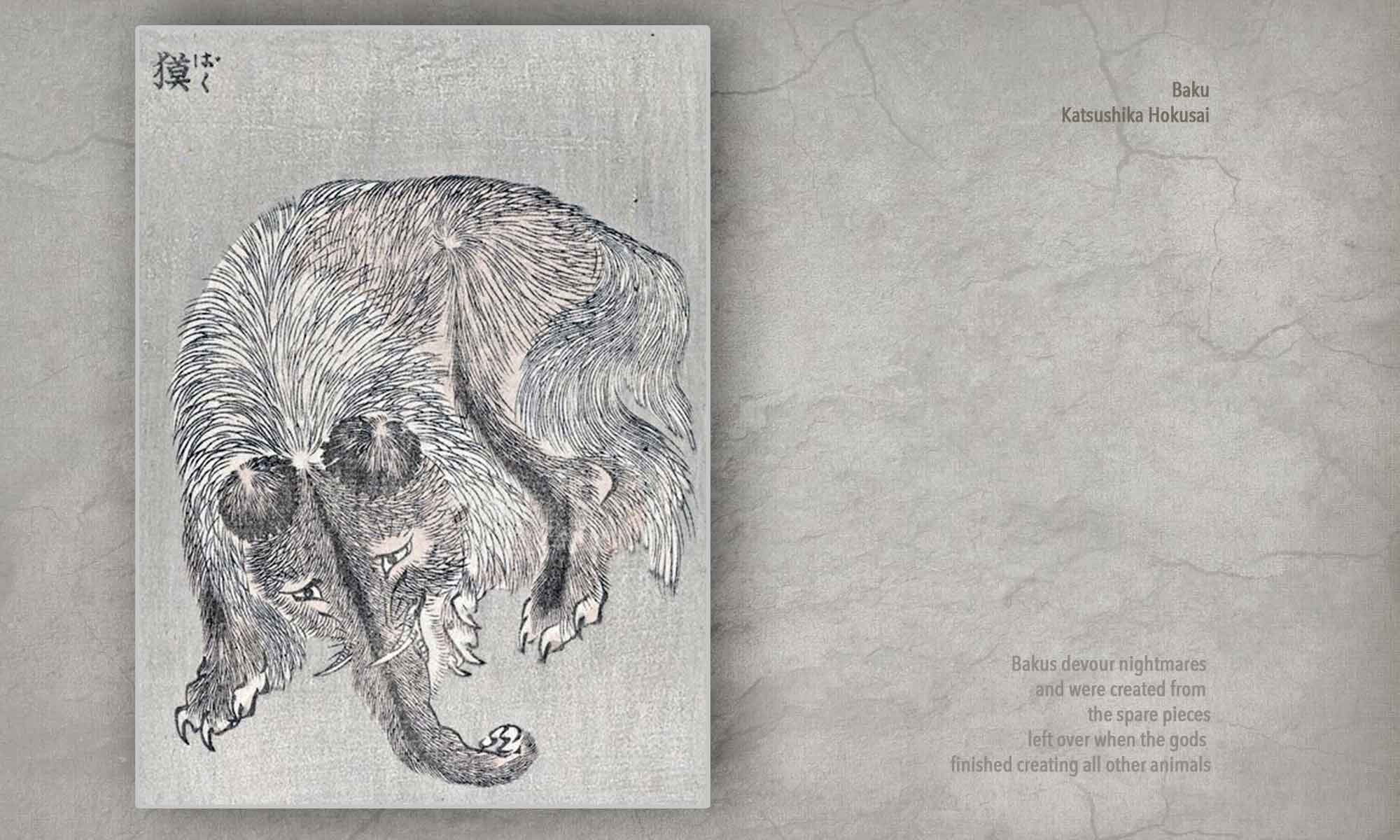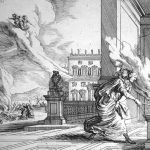 An experimental workshop offers a glimpse of the potential power of a dreaming collective.
An experimental workshop offers a glimpse of the potential power of a dreaming collective.
The full impact of the Dream Mapping Project’s workshop in New York City won’t be known for a while, as each artist who participated now goes forth to reflect, imagine, and create new works. But it was clear that everyone felt the vibrant intensity of the dreams we shared and the dynamism of our interactions with each other, and I’m not alone in saying it was the most powerful process of exploring dreams I have ever experienced.
We gathered on Friday morning, May 11, for an open-air breakfast at the Butcher’s Daughter restaurant, seven of us sitting outside at a table set for four. It was a beautiful sunny day, and as the relentlessly honking trucks and cars roared past on the street just a few feet away, we had our first chance to talk and get to know each other. We had been meeting via video conference for several months, but this was the first time most of us had met in person.
 From the restaurant we walked to our base camp for the weekend, a second-story loft on a tiny street curving through the heart of Chinatown. It was a perfect space for our needs, with gentle theater lighting, a small stage, a couch, several chairs, a restroom, a curtained area with a video projector, and a tea and snack station.
From the restaurant we walked to our base camp for the weekend, a second-story loft on a tiny street curving through the heart of Chinatown. It was a perfect space for our needs, with gentle theater lighting, a small stage, a couch, several chairs, a restroom, a curtained area with a video projector, and a tea and snack station.
We started with introductions, as each participant told the rest of us about their family background, cultural traditions, artistic practices, and international journeys as immigrants. We talked about sleep, and dreams, and the various ideas and theories people have developed to interpret their dreams. I told them about the general dream-sharing process we would be using during the workshop, and I described the most important principles for making sure this process became a positive experience for everyone, drawing on Jeremy Taylor’s basic approach to projective dreamwork. I emphasized the need for everyone to feel safe and respected, and I encouraged us all to practice the virtues of patience, empathy, playfulness, and trust.
Following a lunch break, we invited a local musical artist, Rome, to officially launch the workshop with an hour-long “sound bath” performance. Using a specially designed set of seven metal bowls, each one finely tuned to a specific musical note, Rome created a strong vibrational field within the loft space, playing notes, harmonies, and rhythms that resonated all through our bodies.
 Now in a very contemplative state of mind, we shared for first time the dream we had each chosen to bring to the workshop. The suggestion was to bring a “big dream,” a dream that’s especially memorable and still feels vivid and powerful today, even if it came from many years ago. Each participant described their dream twice, in the present tense, to help the rest of the group get a full, holistic sense of the dream’s characters, settings, feelings, etc. I asked everyone to give a title to their dreams, and this is what they offered:
Now in a very contemplative state of mind, we shared for first time the dream we had each chosen to bring to the workshop. The suggestion was to bring a “big dream,” a dream that’s especially memorable and still feels vivid and powerful today, even if it came from many years ago. Each participant described their dream twice, in the present tense, to help the rest of the group get a full, holistic sense of the dream’s characters, settings, feelings, etc. I asked everyone to give a title to their dreams, and this is what they offered:
Jennifer (from Mexico, living in Venice): Tasting the Moon
Viktoria (from Ukraine, living in Berlin): Giving Birth to a New Me
Alisa (from Russia, living in New York City): The Potato Dream
Victor (from Zambia, living in Oslo): Creepy Lungs & A New Beginning
Kristof (from Flanders, living in Brussels): The Ancestor Dream
Lana: (from Jordan, living in rural Netherlands): Wear the Dance Belt on Your Head
Kelly: (from California, living in Portland): Being Dissected by the Evil Alien
(Note: the titles may change, depending on how the process unfolds from here.)
This took us through the rest of the evening, as we eventually opened the conversation to include all the dreams and began pondering their various points of immediate convergence (such as family members, animals, flying, loss, fire, crying, hope).
The next day we spiraled more deeply into these dreams, carefully exploring each element of each dream and inviting everyone in the group to share unexpected feelings, forgotten memories, and intuitive insights. Two dream-savvy visitors, Bernard Welt and Margot Jewers, joined us for a few hours to add their perspectives. At a certain point Alisa took the lead as the discussion became more psychological, bringing in ideas from Freud, Jung, and Gestalt theory, and also more spiritual, expanding into realms of transpersonal experience and metaphysical awareness. We paused for long digressions to hear each other’s personal stories, many of which had never been told before. The dreams themselves became a living presence in the room, like visitors from another dimension, the cosmic +1 for each member of the group.
As the night wore on, we began discussing our plans to create a collaborative performance that we could present on Sunday evening, at the end of the workshop. We had invited a few local friends to attend, and we wanted to share something special with them, something they would find interesting, entertaining, and hopefully dream-provoking. But we had no specific plan yet, and we finally decided to end for the day, get some rest, and trust that inspiration would strike.
When we gathered the following morning, everyone brought an impressive degree of energy and focus. Led by Lana and Jennifer, we quickly dove into a series of theater and enactment exercises, playing with our dreams in more actively embodied ways. By this point it felt almost effortless to slip into the dream characters and let them interact with each other. And yet (speaking for myself), it also felt utterly surrealistic to embody one of my own “big dreams” while moving through a space filled with several other fully-immersed dream characters, whose lives and stories and multiplicities of meaning I had come to learn very, very well.
Before we knew it, it was time to prepare the stage, lay out refreshments, and welcome the guests. The performance went by in a blur, and I have no idea what the attendees made of it. I’m pretty sure they had never seen anything like it!
 But after the audience left and we were able to debrief among ourselves, it was clear that everyone felt this kind of process has enormous creative potential, far beyond what we rather spontaneously put together for that evening. We are cooking up plans for additional collaborations, with a goal of presenting a group exhibit at the 2019 conference of the International Association for the Study of Dreams, to be held in Kerkrade, the Netherlands, June 16-20.
But after the audience left and we were able to debrief among ourselves, it was clear that everyone felt this kind of process has enormous creative potential, far beyond what we rather spontaneously put together for that evening. We are cooking up plans for additional collaborations, with a goal of presenting a group exhibit at the 2019 conference of the International Association for the Study of Dreams, to be held in Kerkrade, the Netherlands, June 16-20.
Although the workshop officially ended Sunday evening, most of us stayed a day or two later to work with Kristof for additional video and photography work with our dream characters, going outside the womb-like studio into the vastness of the bright, bustling city. Once again, the dream exploration process took another spiraling plunge into the psychic depths, as our embodied dreams entered a different reality, disclosing new dimensions of meaning.
The dream I shared with the group, “Being Dissected by the Evil Alien,” comes from my early 20’s, and I have been studying and exploring its meanings for many years. Yet the dream became something entirely new during the course of this workshop. Being in a group of immigrants, the Evil Alien suddenly appeared as an immigrant, as a strange and frightening visitor from a radically different place. As I let the members of the group guide me through a deeper exploration of the dream, I gradually became aware of the sensation of being metaphorically “dissected by aliens,” leading to a surprising shift in the locus of my perspective within the dream.
On Monday, Alisa and Kristof dressed me in a black cape and leather mask, and told me to close my eyes. They walked me around for several minutes, spun me in various directions, then told me to open my eyes. I was standing in broad daylight at the intersection of Canal Street and 6th Avenue. Truly, an out-of-body experience—bringing the dream into waking, and waking into the dream. I have never, ever felt like more of an alien in the world.
I’ve asked the other participants to write some reflections about what they felt during and after the workshop, so I will wait until I hear from them before making too many big-picture comments about what it all meant. One thing was very clear on that last night, however—everyone had gained a dramatically deeper insight into their own big dream, and into dreaming in general. The group somehow generated an unusually high degree of trust, engagement, and creativity that made those insights possible. The question I’m now pondering is, how exactly did that happen?
We had done a lot of preparatory work by phone, video, and email, and that certainly helped when we finally got together for the workshop. Alisa arranged for an excellent meeting space, and Lana, Kristof, and Jennifer lent us their theatrical skills. Jeremy Taylor’s approach to group dream-sharing, with its emphasis on the “If it were my dream” preface, provided a simple, common language we could use to safely and respectfully navigate through each other’s dreamscapes.
Perhaps the most important factor was what I am calling (in retrospect) our multi-polar approach to leadership. Alisa and I set the project in motion, and we both made introductory comments at the start of the workshop. But after that, the process took on a life of its own, as different members of the group stepped forward at various points to guide the next twist of the spiral. The final performance was a thoroughly collaborative effort that emerged organically, with no fixed plans or expectations. The multiplicities of the group—multiplicities of personality, culture, gender, race, sexuality, and artistic media—became an amazing source of interpretive strength.
Two other serendipitous events helped prepare me for the workshop. The first came on Wednesday, the day before I traveled to New York, when I had a cup of tea with Delanna Studi, who wrote and performed the one-woman show “And So We Walked,” a fascinating dramatic memoir about her journey, in waking and dreaming, to reconnect with her Cherokee heritage. I saw the show that evening at Portland Center Stage, and felt extremely inspired by her courage, creativity, and deep wisdom about the ways of dreaming. The second came the next morning, on the flight to New York, when I read a book I had recently bought, Jon Lipsky’s Dreaming Together: Explore Your Dreams by Acting Them Out (2008), which I figured might give me some ideas for the workshop. Indeed it did! I’ll close here with some quotes from Lipsky, a powerfully creative dreamer in his own right and a long-time professor of theater at Boston University:
“It is this quality—that dreams are both part of us and apart from us—that makes them so valuable to anyone interested in their inner life, and to artists in particular.”
“Dream Enactment is a laboratory for collaborative playmaking. Each dream has to be explored by the ensemble.”
“Dream Theater is a laboratory for practicing the art of ‘rotating’ leadership.”
“So: imagine a nightclub—small round tables, low light, candles—and up where the jazz band would play there’s a stage. On that stage a troupe of actors appears for late-night dreams. A soundman with a synthesizer sits off to one side and starts tolling a bell. The Dream Show is about to start. For the next forty-five minutes, the troupe will present a set of dreams like a set of jazz with themes woven together through image and narrative like some kind of theatrical music. The troupe takes a break and over good wine or strong coffee members of the audience, stimulated by the dream set, share their own reminiscences of dream life. The bell tolls again and a second set of dreams is enacted. Maybe even some dreams culled from the audience are presented as an encore. This is one vision of a Theater of Dreams: a place where actors and audience re-experience their dreams. The style would not be dreamy, but precise. The goal would be to have the audience dream the actors’ dreams. The breadth of experience that we all possess in dreams—what I call ‘Our Own Shakespearean Stage’—would be revealed. Actors and audience would come together in a world of imagination where the fantastic and the mundane sit side by side and our passions are unleashed in the most ordinary circumstances. Here we feel the overlap of our dreamscapes with our waking life, and we leave the theater feeling that our world is much fuller than we usually allow. The magic of a dream show is that it’s essentially autobiographical, a true personal story distilled and embellished by the creativity of the dreamer’s dream weaver. The Dream Café demands a commitment to be true to the dream story, while crafting a theater piece that resonates on a more universal level. This is an attempt to stretch the boundaries of contemporary theater by throwing our intimate, personal, imagistic experiences on a larger archetypal canvas.”

 An international group of artists join together to explore their dreams.
An international group of artists join together to explore their dreams. Peeling away Freudian assumptions to reach a deeper human truth about the capacity to love.
Peeling away Freudian assumptions to reach a deeper human truth about the capacity to love. A quick recap of the plot: Set in the Oklahoma territory in 1906, just before official statehood, the story revolves around two love triangles. In one, a cowboy (Curly) and a farmhand (Jud) vie for the affections of a farmer’s daughter (Laurey). In the other, cowboy Will Parker and Ali Hakim, a Persian traveling salesman, are both involved with Ado Annie, one of Laurey’s girlfriends.
A quick recap of the plot: Set in the Oklahoma territory in 1906, just before official statehood, the story revolves around two love triangles. In one, a cowboy (Curly) and a farmhand (Jud) vie for the affections of a farmer’s daughter (Laurey). In the other, cowboy Will Parker and Ali Hakim, a Persian traveling salesman, are both involved with Ado Annie, one of Laurey’s girlfriends. A brilliant exploration of the dark psychological depths of sexual desire appears in an unlikely place—a country musical from the 1940’s.
A brilliant exploration of the dark psychological depths of sexual desire appears in an unlikely place—a country musical from the 1940’s.
 In the next scene a supremely confident Master Ford brings a group of companions to his house to apprehend Falstaff. His wife, in the midst of sending out the dirty laundry, denies that Sir John is there. Master Ford contemplates the laundry basket, which is about to be sent out for “buck-washing” (a traditional means of laundering clothes by soaking and rinsing them repeatedly with lye, ash, or urine), and utters some strange lines: “Buck? I would I could wash myself of the buck! Buck, buck, buck! Ay, buck; I warrant you, buck—and of the season too, it shall appear” (III.iii.155-157).
In the next scene a supremely confident Master Ford brings a group of companions to his house to apprehend Falstaff. His wife, in the midst of sending out the dirty laundry, denies that Sir John is there. Master Ford contemplates the laundry basket, which is about to be sent out for “buck-washing” (a traditional means of laundering clothes by soaking and rinsing them repeatedly with lye, ash, or urine), and utters some strange lines: “Buck? I would I could wash myself of the buck! Buck, buck, buck! Ay, buck; I warrant you, buck—and of the season too, it shall appear” (III.iii.155-157). To be a king, one must give up sleep and dreams in favor of the ruling duties of waking life.
To be a king, one must give up sleep and dreams in favor of the ruling duties of waking life.
